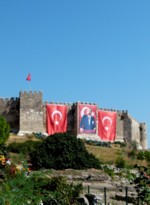Kaş
Kaş is a small town near or on the site of the ancient city of Antiphellos. It has a particularly pretty harbour. It's beloved by yachties, 'grey nomads', who cruise the Mediterranean in floating versions of the vans that traverse inland and coastal Australia. Apparently it's possible to spend weeks moored in Kaş on a shoestring. At dinner we met a couple who were doing just that - leading an idyllic life - living on their yacht and eating-out at the same harbour-side restaurant we'd chosen. It was easy to understand our yachty friends' preference. Kaş has fewer tourists and is, on the whole, a much nicer and less expensive place to spend an evening by the harbour than at Antalya.
Kaş a pretty town with a popular harbour for yachties and the ruins of Antiphellos, a Greco-Roman city up the hill.
Like many ancient towns Antiphellos had a Greco-Roman theatre and the ruins remain a short distance from the Kaş town centre. Indeed until 1923 Kaş was a small island of Greek culture. Then, as I mentioned above, there was exchange of Muslim and Christian populations between Greece and Turkey. So the town's Orthodox Christian population was expelled to Greece leaving a majority of the dwellings abandoned. The town has since recovered but it's still struggling economically - except for the yachties. As a result our hotel was good value too.
The coastal road, heading west out of Kaş, is quite spectacular winding along the cliff-side with the sea to the left. From time to time the two lane road becomes almost impassable due to beachgoers parking in both directions on the roadsides, before making their way down, out-of-sight, to the beaches below.

